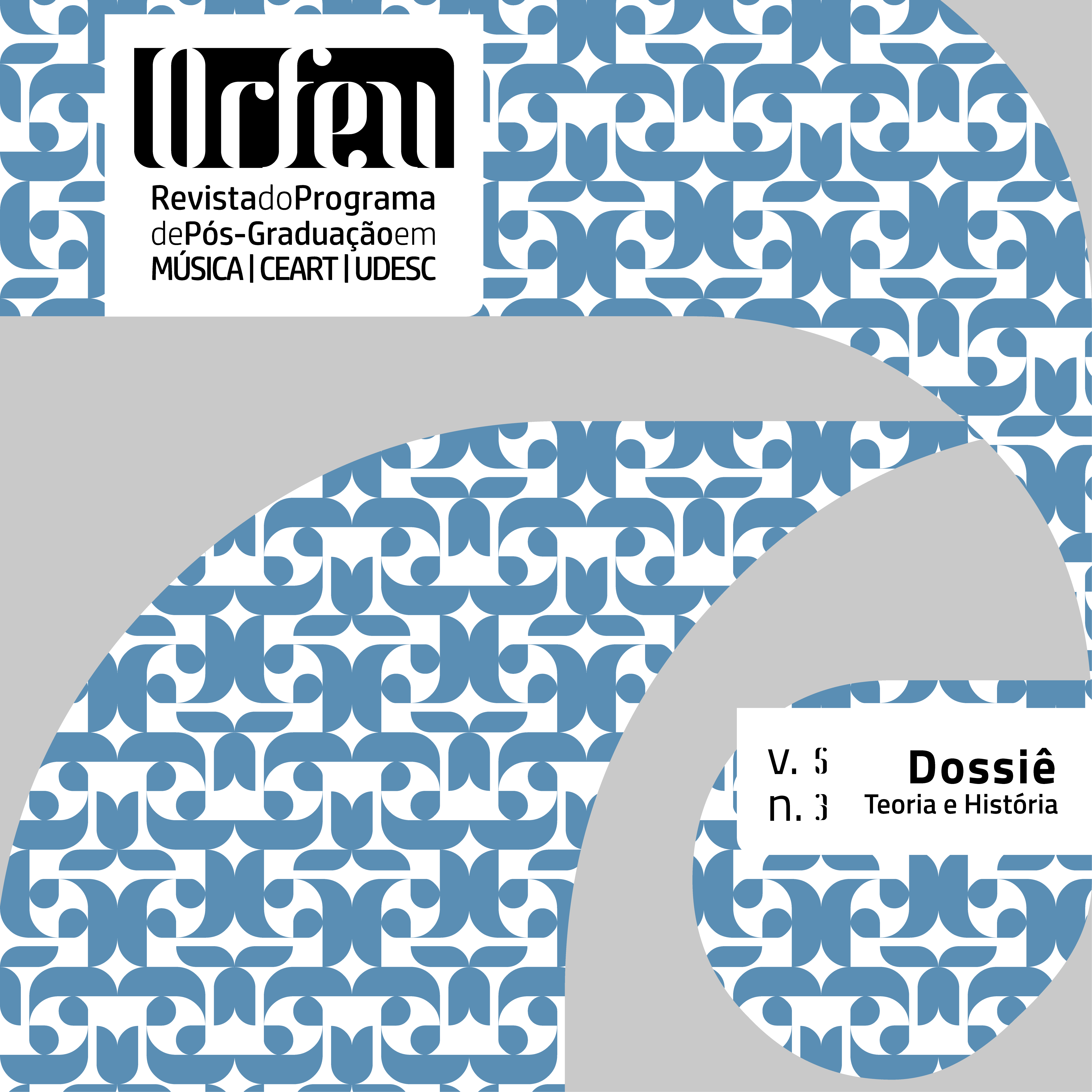Villa-Lobos’s Fourth Symphony: the victory, the defeat, and the comeback
DOI:
https://doi.org/10.5965/2525530405032020341Keywords:
Villa-Lobos, Symphony, Narrativity, Topics theory, Musical analysisAbstract
The purpose of this paper is to present an analysis of Symphony No. 4 (The Victory) by Heitor Villa-Lobos (1887-1959), from formal and narrative perspective. The work was composed in 1919 to celebrate the end of the First World War. Its premiere was planned to a concert in honor of the king and queen of Belgium, who visited Brazil in 1920.
Symphony No. 4 is based on a text written by Luís Gastão d’Escragnolle Dória (1869-1948), so it was originally a symphonic poem. The literary narrative is covered by another, of a musical character, structured in a cyclic form according to the method of Vincent d’Indy. The analysis search for points of closure and detachment among literary and musical narratives, according to theories of narrativity advanced by Eero Tarasti (1994) and Byron Almén (2008), as well musical topic analysis, after Leonard Ratner (1980) Wye Allanbrook (1983), and Raymond Monelle (2000, 2006) among others. My goal is to interpret the musically meaningful aspects resulting from intertextuality between music and text.
Downloads
References
ALLANBROOK, Wye J. Rhythmic Gestures in Mozart: Le Nozze di Figaro and Don Giovanni.
ALMÉN, Byron. A Theory of Musical Narrative. Bloomington, IN: Indiana University Press, 2008.
BOULEZ, Pierre. A música hoje 2. Tradução de Geraldo G. de Souza. São Paulo: Perspectiva, 1992 [1985].
CAPLIN, William. Classical Form: A Theory of Formal Functions for the Instrumental Music of Haydn, Mozart, and Beethoven. New York; Oxford: Oxford University Press, 1998.
CORREIO DA MANHÃ. Morreu o autor dos ‘Pingos e Respingos’: com o falecimento de Bastos Tigre perdem as nossas letras o último humorista sério do Brasil. Rio de Janeiro: 3 ago. 1957. Disponível em: http://memoria.bn.br/DocReader/Hotpage/HotpageBN.aspx?bib=089842_06&pagfis=79742&url=http://memoria.bn.br/docreader#. Acesso em 14 fev. 2020.
CORREIO DA MANHÃ. A ópera Izaht de Villa-Lobos. Rio de Janeiro, 10 jun. 1921. Disponível em: http://memoria.bn.br/DocReader/Hotpage/HotpageBN.aspx?bib=089842_03&pagfis=6512&url=http://memoria.bn.br/docreader#. Acesso em 22 fev. 2020.
DÓRIA, Luís G. d’Escragnolle. A Victoria. In: Jornal do Commercio, Rio de Janeiro, 31 jul. 1919. Acesso em 15 nov. 2019. Disponível em: http://memoria.bn.br/docreader/DocReader.aspx?bib=364568_10&pagfis=42505.
ENYART, John W. The Symphonies of Heitor Villa-Lobos. Dissertation for the degree of Doctor of Philosophy in Music, University of Cincinnati, 1984.
FAGUNDES, Luciana P. A recepção do Embaixador da Paz: um concerto de gala para Epitácio Pessoa. Revista Brasileira de Música, Rio de Janeiro, v. 31, n. 1, p. 163-186, 2018.
FAGUNDES, Luciana P. Uma República em festa: a visita dos reis belgas ao Brasil (1920). Dissertação de Mestrado em História Social. Rio de Janeiro: Universidade Federal do Rio de Janeiro, Instituto de Filosofia e Ciências Sociais, 2007, p. 177-180.
GAMA, Zadig M. F.; MELLO, Celina Maria M. de. Luís Gastão d’Escragnolle Dória: um polígrafo das letras brasileiras. Soletras, Dossiê n. 34, p. 329-353, 2017. DOI: 10.12957.
GUÉRIOS, Paulo. Heitor Villa-Lobos: o caminho sinuoso da predestinação. 2. ed. Curitiba: Edição do autor, 2009.
GUIMARÃES, Luiz et al. Villa-Lobos: visto da plateia e na intimidade (1912/1935). Rio de Janeiro: Arte Moderna, 1972.
GREIMAS, Algirdas J. Sobre o sentido II: ensaios semióticos. Tradução de Dilson F. da Cruz. São Paulo: Nankin; Edusp, 2014 [1980].
HEPOKOSKI, James; DARCY, Warren. Elements of Sonata Theory: Norms, Types, and Deformations in the Late-Eighteenth-Century Sonata. Oxford; New York: Oxford University Press, 2006.
D’INDY, Vincent. Cours de composition musicale. Paris: Durand, 1909.
KATER, Carlos. Villa-Lobos de Rubinstein. Latin American Music Review, v. 8 n. 2, p. 246-253, 1987.
MARIZ, Vasco. Heitor Villa-Lobos, compositor brasileiro. 11. ed. Belo Horizonte: Itatiaia, 1989.
MIGALHAS. Homenagem a Manoel Bastos Tigre. ISSN 1983-392X. Endereço eletrônico: https://www.migalhas.com.br/quentes/188672/homenagem-a-manoel-bastos-tigre. 21 out. 2013. Acesso em 14 fev. 2020.
MONELLE, Raymond. The Musical Topic: Hunt, Military, and Pastoral. Bloomington, IN: Indiana University Press, 2006.
MONELLE, Raymond. The sense of Music. Princeton and Oxford: Princeton University Press, 2000.
MOORTELE, Steven Vande. Two-Dimensional Sonata Form: Form and Cycle in Single-Movement Works by Liszt, Strauss, Schoenberg, and Zemlinsky. Leuven: Leuven University Press, 2009.
RATNER, Leonard. Classic Music: Expression, Form, and Style. New York: Schirmer, 1980.
SALLES, Paulo de Tarso. Os quartetos de cordas de Villa-Lobos: forma e função. São Paulo: Edusp, 2018.
SALLES, Paulo de Tarso. Villa-Lobos, processos composicionais. Campinas: Ed. Unicamp, 2009.
STOÏANOVA, Ivanka. Manuel d’analyse musicale: variations, sonate, formes cycliques. Paris: Minerve, 2000.
TARASTI, Eero. A Theory of Musical Semiotics. Bloomington, IN: Indiana University Press, 1994.
WHEELDON, Marianne. Debussy and La Sonate Cyclique. The Journal of Musicology, v. 22, n. 4, p. 644-679, 2005.
Downloads
Published
How to Cite
Issue
Section
License
Copyright (c) 2020 ORFEU

This work is licensed under a Creative Commons Attribution 4.0 International License.
Authors who submit their manuscripts to be published in this journal agree to the following terms:
1. Authors retain the copyright and grant to the journal the right of first publication, whilst simultaneously permitting their work to be licensed under the Creative Commons License Attribution, which allows the sharing of work with recognition of the authorship and initial publication in this journal.
2. Contributions in this journal are open access; this means they are based in free use, and non-commercial applications.






